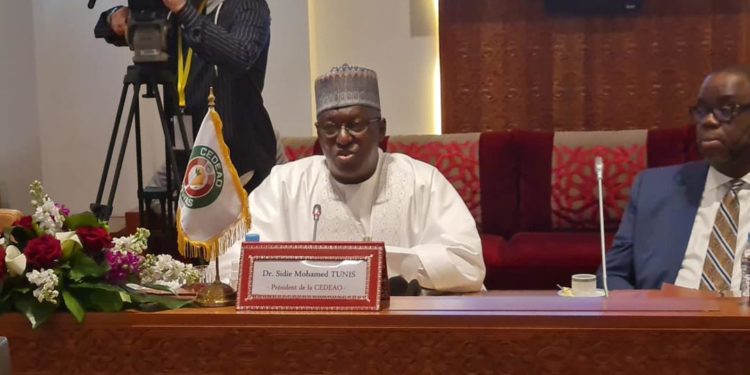The Speaker of the Economic Community of West African States (ECOWAS) Parliament, Sidie Mohamed Tunis, has said that social dialogue is crucial in addressing challenges.
Hon. Tunis made the comment in a speech during the opening session of the 6th International Parliamentary Forum on Social
Justice, which was held under the theme: “Social Dialogue and the Stakes of the Social State.” The conference was convened in Rabat, the capital of the Kingdom of Morocco on 20th February, 2022.
The Sierra Leonean lawmaker noted that the forum comes as a consequence of the UN General Assembly’s proclamation, declaring 20th February as World Day of Social Justice.
Tunis said the declaration challenged States to devote the day to promoting national activities under the objectives and goals of the 1995 World Summit for Social Development related to the conquest of poverty, the goal of full employment, and fostering of overarching objectives of development and social integration.
“It is an exceptional honor to be able to address you as part of this forum that gathers prominent personalities, who are acquainted with this challenging and profoundly complex topic,” Tunis said.
He added: “We are fully aware that the global economic pressure has resulted in mass layoffs, substantial growth of the informal economy and greater pressure on businesses, which has, in turn, resulted in severely deteriorating working conditions and access to basic social protection in countries around the African continent and the world at large. The covid-19 pandemic has also resulted in a massive reduction in economic activities, which is impacting greatly on the global manufacturing and service sectors in the form of a global employment downturn. Furthermore, workplace rights, including paid sick leave, healthcare, and unemployment benefits, as well as avoiding hazardous work, are among the issues that need urgent attention.”
The ECOWAS Parliament Speaker opined that to improve the appropriate working conditions would lead to the creation of decent and sustainable employment, hence paving the way towards the economic development of the state, noting, “we must support regional advocacy and local social dialogue at work.
“Social dialogue, which can be achieved in the form of collective bargaining, consultation, negotiation, information sharing, as well a joint problem-solving and decision-making activities, is invaluable in our endeavors to reduce social tensions in times of crisis, and design policies that bridge the gaps in our nations. Encouraging social dialogue would also create a solid foundation for the commitment of employers and workers to joint action with governments in taking strategic measures to overcome the crisis and obtain sustainable recovery,” Hon. Tunis said.
He recalled that at the regional level, in 2011, the Regional Tripartite Forum of Social dialogue was established by the ECOWAS Commission. The Forum was meant to serve as a platform for consultations, negotiations, and information exchanges between representatives of government and its workers, as well as employers’ organizations on issues of decent work and employment in the region.
This was preceded by the Memorandum of Understanding entered into in June 2005, between ECOWAS and the ILO, committing both parties to undertake joint consultations and implement programs to promote decent work as a means towards economic prosperity, peace, and stability in the region.
In 2016, ILO and ECOWAS also pledged to the design and implementation of a Decent Work Regional Program (DWRP). This aligns with the ECOWAS Vision 2050, which seeks to deliver a community of people fully integrated into a peaceful, prosperous region with strong institutions and respect for fundamental freedoms, working for inclusive and sustainable development.
Tunis however disclosed that, currently, all 15 member states of the ECOWAS have ratified the following: The Forced Labor Convention, 1930 (No. 29); The Abolition of Forced Labor Convention, 1957 (No.105); The Discrimination (Employment and Occupation) Convention, 1958 (No. 111); The Right to Organize and Collective Bargaining Convention, 1949 (No. 98); The Equal Remuneration Convention, 1951 (No. 100); The Worst Forms of Child Labor Convention, 1999 (No. 182).
“In addition, 14 countries have ratified the Minimum Age Convention, 1973 (No. 138); and the Freedom of Association and Protection of the Right to Organize Convention, 1948 (No. 87). These are critical and strategic steps that demonstrate our commitment to social dialogue and understanding its stake on the social state,” Tunis noted.
Tunis reiterated that “Taking into account the cultural, historical, economic and political contexts of the social state, it holds that social dialogue is an invaluable mechanism for the design of policies to promote national priorities. To achieve the Sustainable Development Goal 2030, which places decent work for all at the heart of its policies for sustainable and inclusive growth and development, we believe social dialogue is a critical element that should be used in addressing the challenges that may arise.”






















